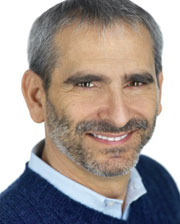 According to Chabad.org, every year on the holiday of Shavuot we renew our acceptance of G‑d’s gift and G‑d “re-gives” the Torah to us.
According to Chabad.org, every year on the holiday of Shavuot we renew our acceptance of G‑d’s gift and G‑d “re-gives” the Torah to us.
As the significance of Shavuot is discussed at the annual Tikkun Leyl Shavuot program May 14 at Kehilath Israel Synagogue (see box for details), Rabbi Steve Greenberg, the keynote speaker at this year’s celebration, would like nothing more than to see the Orthodox community become more accepting to the Jewish gay community. Rabbi Greenberg is the author of the groundbreaking book “Wrestling with God & Men: Homosexuality in the Jewish Tradition.”
Rabbi Greenberg received his Bachelor of Arts degree in philosophy from Yeshiva University and his rabbinical ordination from Rabbi Isaac Elchanan Theological Seminary. He is a graduate of the Jerusalem Fellows program, a two-year fellowship for senior Jewish educators sponsored by the Mandel Institute. His book is the basis of his keynote topic, “Wrestling with God and Men: Four Rationales for the Biblical Prohibition.”
The title of his speech alludes to Leviticus 18:22 that prohibits sex between men.
“There are various reasons that are given for the prohibition between sex and men,” said the rabbi. “My aim will be to limit the conversation a little bit because of the way in which the verse is written and the context.”
He said the title of his keynote may be understood better if it was “Wrestling with God and Men: Four rationales for addressing Leviticus 18:22.”
“But when you put 18:22 in a title, people go ‘huh?’ ”
A senior teaching fellow at CLAL-The National Jewish Center for Learning and Leadership, Rabbi Greenberg came out as openly gay in 1999. Last year he and his partner, also named Steven, were civilly married in New York. They have a 2-year-old daughter, Amalia.
His book has just been published in Hebrew for the first time and when he appears in Kansas City he will have just returned from a trip to Israel to promote it. In the new forward he writes that it’s still very scary to be gay in the traditional world.
“Even just to admit to oneself that one is gay, can be frightening. I remember feeling at the age of 28 that were I to say the words, ‘I am gay,’ I would immediately be standing at the edge of a cliff with no idea how to take the next step. When all the good futures that one has ever imagined vanish, the despair can easily lead to self-destructive choices,” Rabbi Greenberg wrote.
He knows it would be easier to live his life if he chose to be Reform or Conservative and it doesn’t bother him if other people make that choice. But he grew up Orthodox and feels at home in an Orthodox community and that’s why he would like the more conservative community to become more inclusive.
“If you’re a kid growing up in an Orthodox community you’re in trouble because gay people didn’t stay and make room. There were only two options if you were gay. You were quiet and suffered in silence or you left. What that meant was if you were growing up in that community there was no one to talk to, and no means of understanding yourself. Lots of kids have basically harmed themselves, committed suicide, because they basically saw that there will be no life for them.
“My aim is to make sure that the tradition is responsible to everyone in the community. You wouldn’t want a tradition only responsible to people with green eyes or people who are right-handed or people who are full bodied and have no disabilities. You want them to be responsible to everybody. That’s what a religious tradition ought to do. So that’s what I’m trying to do, making it responsible to the whole community,” he said.
He believes the Orthodox community can become more accepting to gays.
“I see this as the contemporary challenge of new scientific and human understanding that pushes the system to respond in a new way to an issue,” he said. “What happens is circumstances just shift and the meaning or understanding of human relations of various kinds shift and the law needs to address the new circumstance, otherwise it becomes either cruel or irrelevant to the people living in that moment.”
At CLAL he is in charge of diversity programs and concentrates mostly on LGBT issues. In his bio for the organization, he is called a religious iconoclast — a non-conformist. He said non-conformism inside the Orthodox community is actually rather traditional.
“Non-conformism inside the community, inside the language of the tradition is an ordinary affair. In fact, there’s a hesitation to be comfortable with conformism because it leads to a certain kind of deadness in regard to religious responsibility, which is always a more vital affair. So I see myself as somewhat of a non-conformist in some areas,” he said.
On the other hand, he wonders if the desire to create a scenario in the government for same-sex marriage, is conformism or non-conformism.
“The fact that we want what ordinary, boring straight folks want, which is a committed life to somebody, is that conformism or is that iconoclastism? You can claim that single straight folks are much more challenging to the norm than are gay folks who want to get married.
“In other words I think the language is a little bit limited, meaning that I actually think that when the tradition comes to an impasse then sometimes the iconoclast is the person who shows the way to a richer engagement with the original religious values,” he explained.


